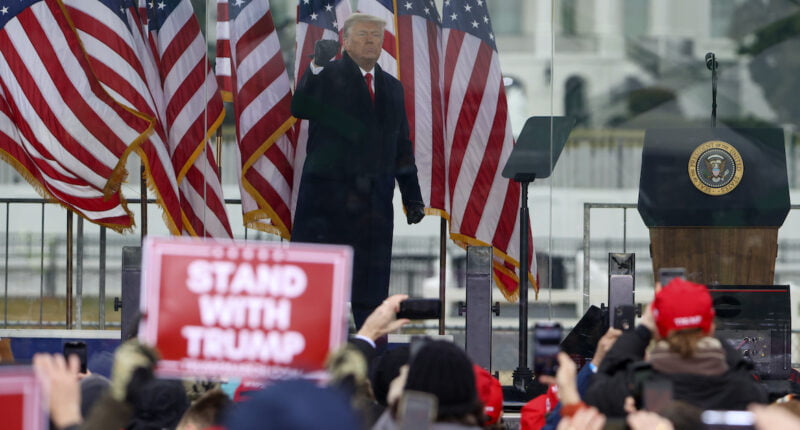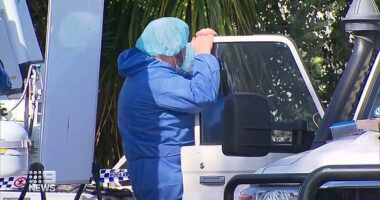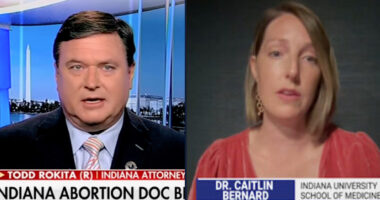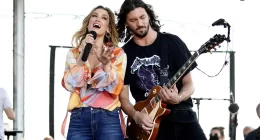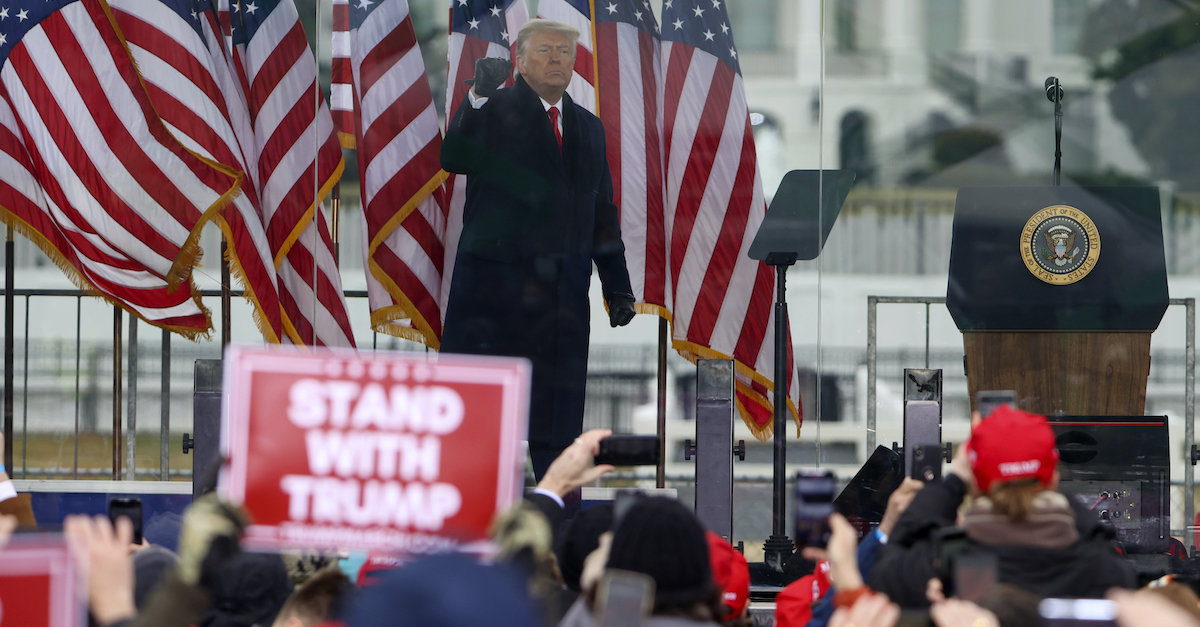
Former President Donald Trump delivers a speech at the Ellipse on Jan. 6, shortly before his mob of supporters ran riot inside the U.S. Capitol. (Photo by Tasos Katopodis/Getty Images)
The Justice Department, which has prosecuted nearly 1,000 people to date in connection with the Jan. 6 attack on the U.S. Capitol, believes that former President Donald Trump should face potential liability for his role in the riot.
In an amicus brief filed on Thursday, lawyers for the DOJ argued that while immunity for sitting presidents from civil lawsuits is rightfully broad, it is not absolute — it does have an “outer perimeter.” The DOJ argues that it’s possible that Trump did indeed spur his supporters on to violence.
“No part of a President’s official responsibilities includes the incitement of imminent private violence,” the Justice Department argues. “By definition, such conduct plainly falls outside the President’s constitutional and statutory duties.”
Attorneys for Trump had argued that a president is “undoubtedly” entitled to absolute immunity from civil liability “when he or she gives a speech on a matter of public concern.”
“That President Trump was the incumbent President when the speech was given coupled with the official nature of the act cloaks him with absolute immunity,” said one of Trump’s appellate briefs, authored in part by Trump lawyer Jesse Binnall, who had previously expressed this view in the lower court.
The Justice Department disagrees with this position and argued that the standard for determining whether a president is immune from liability for certain speech already exists.
“[T]he scope of a President’s absolute immunity in this context should be informed by principles analogous to those the Supreme Court has developed in defining the sort of incitement that is unprotected by the First Amendment,” the brief says (citations omitted). “Under Brandenburg v. Ohio, speech lies outside the First Amendment only if it is ‘directed to inciting or producing imminent lawless action and is likely to incite or produce such action.’ That standard reflects our ‘profound national commitment’ that ‘debate on public issues should be uninhibited, robust, and wide-open.’ And it ensures that speakers cannot be held liable merely for ’emotionally charged rhetoric,’ ‘strong language,’ or ‘spontaneous and emotional appeals.””
The government said that longstanding Supreme Court precedent supports its position.
“Nixon v. Fitzgerald establishes a rule of absolute immunity for the President’s official acts,” the brief says. “It is not a rule of absolute immunity for the President regardless of the nature of his acts.”
The DOJ argued that granting “absolute immunity” for all of a president’s speech would undermine longstanding principles of liability.
“To extend immunity to such incitement would contradict the ‘constitutional heritage and structure,’ that have informed and
justified the doctrine of presidential immunity,” the brief says (citations omitted).
The DOJ did not take a position on whether Trump’s speech that day actually did reach that level of incitement, only that the appellate court should conclude that Brandenburg should be the standard for determining whether a president could be sued for speech that reaches that stringent standard.
The Justice Department’s amicus brief was filed in connection with multiple civil cases filed against Trump over his role in sparking the Jan. 6 Capitol riot, when thousands of Trump supporters descended on the Capitol as Congress was certifying Joe Biden’s 2020 electoral win. The mob eventually overwhelmed police and broke into the building, forcing lawmakers and staffers to either evacuate or shelter in place for several harrowing hours.
U.S. District Judge Amit Mehta had denied Trump’s motion to dismiss, finding that immunity for a sitting president’s speech relating to official acts did not extend to his words that plaintiff allege sparked the violence. Trump appealed, insisting that he has absolute immunity because he was speaking on a matter “of public concern.”
The case is now before three U.S. Circuit Judges: Chief Judge Sri Srinivasan, a Barack Obama appointee, Judge George Katsas, a Trump appointee, and Judge Judith Rogers, a Bill Clinton appointee. The three-judge panel heard oral arguments from the parties in December but had asked the DOJ to weigh in.
The government’s brief notes that Trump didn’t challenge Mehta’s conclusion that the lawsuits do “plausibly allege that his speech instigated the attack on the Capitol.
Instead, the DOJ notes, Trump’s appeal advances “only a single, categorical argument: A President is always immune from any civil suits based on his ‘speech on matters of public concern’ — even if that speech also constitutes incitement to imminent private violence.”
“The United States respectfully submits that the Court should reject that categorical argument,” the brief adds.
Read the Justice Department’s brief here.
Have a tip we should know? [email protected]
